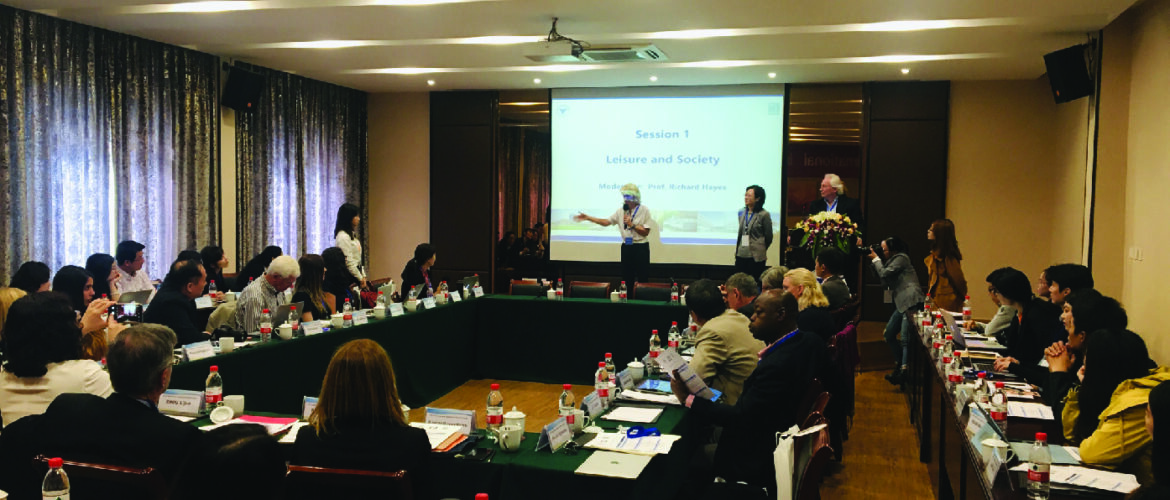Students and members of the WLO Board of Directors were welcome by Jane Zhou and Cehn Weiying, deputy director of the Office of Global Engagement at Zhejiang University (ZJU). The College of Education at ZJU, organizing the Forum, attaches great importance to internationalization, as proved by the college recently joining World Leisure Center of Excellence (WLCE) network, with the aim to further contribute to research in the field of sports, a pillar of Chinese national economy.
Dr. Roger Coles, WLO Chairman, acknowledged ZJU’s international prestige, ranked among the top 100 in the world. WLO Board member, Jane Zhou, on her turn, introduced ZJU and the WLCE. She presented ZJU’s partnerships around the world. The WLCE at ZJU’s main research areas are: Leisure Culture and Industry, Exercise and Health, and Leisure Education. In 2018-2019, WLCE at ZJU has produced 39 articles in top academic journals (including SSCI-indexed journals), and numerous research projects.
The Forum was organized in three consecutive sessions, participated by both international and ZJU researchers, who presented their most recent work on different areas: Leisure and Society; Leisure, Sports and Technology; Leisure and Landscapes, and Leisure and Sports.
In the first session, moderated by Dr. Richard Hayes, on Leisure and Society, Dr. Atara Sivan, from Hong Kong Baptist University, presented the results of a research project on “Life beyond schooling”, aiming to investigate young people’s choices and participation in their most important and interesting leisure activities. Dr. LYU Jiaying, associate professor at ZJU, presented a longitudinal study observing the moderating effect of leisure on the relation between residential mobility and depression among older adults.
Session 2 was moderated by Dr. Marie Young, and it focused on Leisure, Sports and Technology. First presenter in the session was Dr. Stephen Anderson, who shared the results of a research exploring sailing as a potential therapeutic intervention for people with disabilities, developed together with Dr. Cari Autry at a Simulation Lab at East Carolina University. The research presented by Dr. WEN Xu interrogates how technology and big data could be used to further explore the relation between physical activity and health. To close the session, SONG Xian, a doctoral researcher at ZJU, presented an ongoing research on fine hand movement.
In the third session, moderated by Dr. Cristina Ortega, on Leisure and Landscapes, Dr. Miklos Banhidi, from Széchenyi István University in Hungary, explored the concept of smart cities in relation to leisure, and posed the question about how the WLO could get more actively involved in environmentally sustainable development. Dr. Lawal Mohammed Marafa, from The Chinese University of Hong Kong, delivered a presentation on a study exploring visual and sound characteristics of spaces which are linked to tranquility. As a result of this work, researchers are trying to connect with policymakers to see how the concept of tranquility can be incorporated into urban planning. In the same session, Ms. Yvonne Klerks presented the research work done at the WLCE at Breda University of Applied Sciences, characterized by a strong interdisciplinary approach within domains.
Dr. LING Ping was the moderator of the fourth and last session, which focused on Leisure and Sports. First in this session, Dr. HUANG Cong’s research questions “Is adiponectin good or bad for muscle fitness?”. After him, Dr. LIU Lucen presented a study focusing on non-Western, Maori cultural influences on the perception of risk of female participants in waka ama (canoeing). Finally, Dr. QIU Yajun, from ZJU, delivered a presentation on a study exploring 19 women’s serious leisure physical activity.
This was a great opportunity for learning about the latest research being conducted on different aspects of the leisure theory and practice.





Leave a Comment